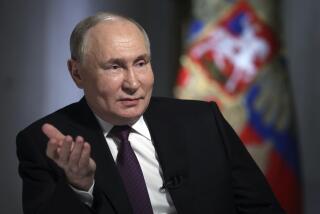Moscow Hints It Might Join U.N. Force in Gulf : Soviet Union: The Kremlin calls for concerted action by the world body to halt Iraqi aggression.
- Share via
MOSCOW — The Soviet Union called Thursday for concerted U.N. action to halt Iraqi aggression in the Persian Gulf and said it is ready to immediately begin consultations to that end with the world organization’s military leaders.
Although a Kremlin official, as had been expected, flatly ruled out Soviet participation in U.S.-led military action against Iraq, he said for the first time that the Soviet Union would consider joining in a multinational force if one is ultimately agreed upon by the United Nations.
If the United Nations “takes a decision on the use of a multinational force, the Soviet Union will, on that basis, work out the line to be followed,” Foreign Ministry spokesman Yuri A. Gremitskikh said. “At this time, there is no question of taking part in a multinational force or a sea blockade outside the framework of the U.N. Security Council,” he added.
Gremitskikh, speaking at a news conference called to give the first official Soviet reaction to the massive deployment of U.S. troops in the Persian Gulf and Iraq’s annexation of Kuwait, also gave tacit consent to the airlift of GIs now under way.
The official government statement Gremitskikh read to reporters refrained from criticizing the move--a pointed contrast to past Soviet complaints over the deployment of U.S. military might--and merely pointed out that history shows it is best to resolve crises through “collective efforts and the utmost use of U.N. mechanisms.”
The Soviet statement called for the 15-member U.N. Security Council to deal with the Persian Gulf crisis “on a permanent basis” and gave the first official indication that the Soviets are willing to talk about coordinated military moves.
“We are ready to immediately begin consultations within the framework of the Military Staff Committee of the Security Council, which, in accordance with the U.N. Charter, can fulfill very important functions,” the statement said.
The Military Staff Committee consists of the chiefs of staff of the five permanent members of the Security Council: China, France, the Soviet Union, Britain and the United States.
Under special agreements, the Security Council has the power to call on its member countries for military and other aid, but the Soviet Union has rarely participated in U.N. multinational forces. Still, “that’s one of the possibilities,” a U.S. official in Washington said. “There will be a number of countries that will be stepping forward to help defend Saudi Arabia.”
The Soviet Union’s status as a permanent member of the Security Council gives it a veto to block actions it opposes, so it will have a fundamental role in deciding what strategy the international body ultimately pursues. Gremitskikh’s remarks indicated that the Kremlin was not proposing a U.N.-sponsored force--only that it wouldn’t rule one out.
During the 1980-88 Iran-Iraq War in the mid-1980s, the Soviet Union proposed that a U.N. naval force be created to protect merchant shipping in the Persian Gulf, but it was never organized. That proposal, and Thursday’s statement, coincided with President Mikhail S. Gorbachev’s general policy of promoting an expanded role for the United Nations to defuse regional conflicts and encourage world cooperation.
The Soviet Union has sent a destroyer and an anti-submarine ship to the Persian Gulf, but Gremitskikh said at the news conference they were meant to defend Soviet commercial shipping.
However, Secretary of State James A. Baker III told reporters traveling with him to Turkey that Moscow had dispatched its warships for use in any international blockade, according to a phone conversation he reportedly had with Soviet Foreign Minister Eduard A. Shevardnadze.
In a rare sign of coordination among the fast-disintegrating Warsaw Pact, Deputy Foreign Minister Alexander M. Belonogov met in Moscow with representatives of the alliance to inform them of Soviet efforts in the gulf, the official Tass news agency said.
State-run media here have lambasted Iraq, a former Soviet ally, for the invasion of Kuwait, and about 100 people protested outside the Iraqi Embassy in Moscow. Many hoisted posters showing Iraqi President Saddam Hussein festooned with swastikas and warning: “The Danger of Neo-Nazism. Hitler Began the Same Way.”
Soviet television aired a panel discussion of the Persian Gulf crisis, and experts on the region pointed out that the Soviet Union will gain because the tensions have driven up the price of oil. The Soviet Union, a major oil exporter, has suffered from the recent low prices and has been struggling to find alternate ways to bring in hard currency.
Stanislav Kondrashov, an analyst for the government newspaper Izvestia, said the Soviet Union would join a worldwide boycott of Iraqi oil. He said it formerly received oil as payment for goods--presumably the weapons it supplied the Iraqis for more than 20 years, many of which armed the soldiers that invaded Kuwait.
Gremitskikh said the Soviet Union is concerned about the 9,000 Soviet specialists--many of them military advisers who accompanied the arms sales--in Iraq, as well as about 900 Soviet citizens in Kuwait.
Asked whether the Soviet military advisers are continuing to work with the Iraqi army in spite of the Kremlin’s condemnation of the Baghdad government, Gremitskikh said he does not know.
“But I think the advice to Iraq to attack Kuwait did not come from our advisers,” he said.
More to Read
Sign up for Essential California
The most important California stories and recommendations in your inbox every morning.
You may occasionally receive promotional content from the Los Angeles Times.













